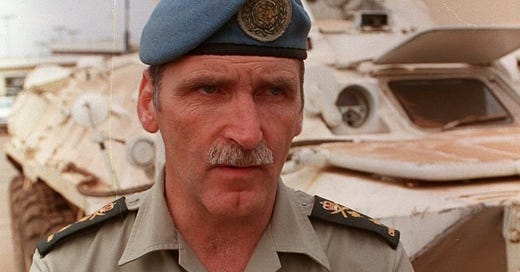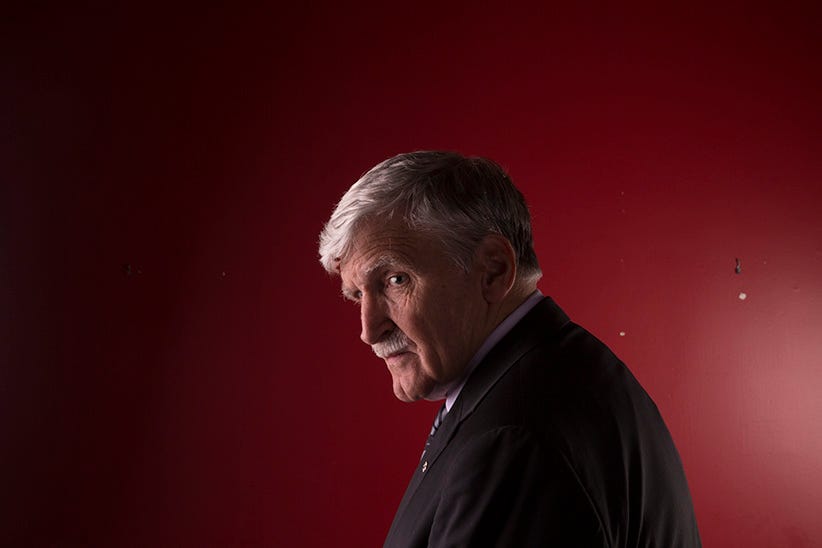We are all Roméo Dallaire
The man who witnessed the Rwandan genocide was a premonition for our times.
At the centre of our world lies a void. A huge featureless hole, dull and beige-coloured, where innocent people go to be murdered. Into this void disappear their lives, their histories, their worlds: from it no meaning can emerge. It is simply a brute fact. The void is just there. You can come right to the edge and peer in.
In 1993, Canadian lieutenant-general Roméo Dallaire was taken to the edge of that void and made to stare into it, paralysed, as if strapped to a gurney or lost in a dream. Crippled with the serene neutrality of international law, the head of the UN’s peacekeeping mission in Rwanda virtually stood by as Hutu supremacists killed just shy of a million Tutsis over the course of three months.
Dallaire had men with guns. He had the ear of powerful governments. He saw with his eyes and ears a genocide being constructed with careful deliberation. He knew where thousands of machetes were cached in a warehouse. Hutu radio stations blasted incitements to murder daily. Lists of Tutsis were being drawn up for zero hour.
Dallaire sent a series of increasingly grave diplomatic cables warning his UN higher-ups of the impending slaughter. They didn’t care. As a UN official later put it, Dallaire’s desperate pleas met with “a brick wall of indifference, repudiation, contempt or silence with annihilating regularity.”1 As the head of a peacekeeping mission, Dallaire was restricted by rules of engagement that rendered his little force utterly impotent. So the general was taken to the edge of the void and frozen there, sunk up to his knees in wet mud. Into the hole poured thousands of living bodies, swallowed whole before his eyes.
When the killing began, Dallaire did what he could: very little. The backbone of his mission, the Belgian contingent, pulled out of Rwanda when ten of their soldiers were tortured and executed by Hutu forces. So Dallaire tried to establish safezones protected by little more than the UN’s good name. Across Kigali, thousands of Tutsis flooded anywhere there was a square inch of property owned or occupied by UN staff. This was Dallaire’s only strategy: place a stadium or office complex under the UN name, and cram into it as many civilians as possible. Like stopping a mob with police tape.
Dallaire saved tens of thousands of lives, yet his failure to prevent the butchery of some 800,000 innocents ruined him. The general has lived the last thirty years haunted by ghosts, stricken with a special type of madness. Traumatised beyond belief by the Rwandan apocalypse, wracked with guilt and despair, nightmares and suicide attempts: Dallaire’s body pays daily penance for his inability to avert massacre and war. “I’ve got six or seven years of therapy behind me, and that’s done next to nothing,” he recounted later. “None of the stuff ever disappears. It’s a matter of avoiding scenarios that trigger things.”2
Dallaire became easy to mock. During later genocide trials at the ICRC, when the general testified for the prosecution against key genocidaires, Dallaire was battered by a defence team who ripped through his trauma-scrambled memories like wet newspaper. Personally insulted, berated for his long-winded answers, “one attorney even asked if Dallaire might have been “intoxicated” or “brainwashed.”3 As the void’s wet stench seeped faintly through vents in the courtroom, Dallaire’s only hope was that his testimony would not undermine the prosecution’s quest to put killers behind bars.
Something strange happened in the years after Dallaire flew home from Rwanda. Year by year, our cameras and phone screens inched us closer to the killing fields. Now we drink our coffees with drowning Somalians and browse our social media with wounded Palestinians. Now you are Roméo Dallaire and I am too.
We are rooted on the edge of spectacles of violence we are powerless to stop yet inextricably complicit in. Here we are perched on the rim of the void, casting our words into the great big hole down which thousands of Palestinians and Eritreans and Afghans have disappeared entirely.
Like Dallaire, each of us must bear the complicity of inaction. Worse than doing nothing, we contribute indirectly to the bloodletting. Our tax dollars fund attacking armies and a hemoclysm of rockets and bombs. Our leaders cover for genocidal governments in the turgid theatre that is international politics.
Yet, as with Dallaire, this paralysis is induced from outside. We too are stifled by our masters, by a sanitised liberal paradigm of international law that relegates entire peoples to hells of human design. Like Dallaire, those of us appalled by the crime of war and slaughter can do little more besides send our communiqués and condemnations into the static grey.
In the end, language was Dallaire’s only real weapon — salvos of words cast across oceans to try and convince his bosses to see the violence for what it really was and do something about it. Words are a feeble counter to machine guns, but they are not powerless. As James Dawes concludes, there is likely only one crime of genocide that we all have the power to combat from our homes: “the deliberate elimination of speech” that transforms people into ‘cockroaches’, silences victims, and obscures killings under a haze of stultifying jargon. Dallaire’s mission “to replace the quiet of the murdered with clear, unrelenting language” is his, and our, only way to face the dead.4
In one crucial aspect we are not Roméo Dallaire. The general was forced to experience war directly — with his own senses — and in a considerable degree of personal danger. We have the ability to turn off the violence on our screens and put our attention elsewhere.
But Dallaire has made clear that some of the most profound wounds of his experience in Rwanda weren’t simply caused by “the extremes and ugliness of war.” There was an inextricably moral dimension to his injury: much of what has haunted the general most from the days of the genocide were not killings in the streets of Kigali, but actions taken by men in suits in fluorescent-lit offices in New York and Washington.
Dallaire describes the moral dimension of his trauma in his wrenching memoir, Waiting For First Light:
[During the genocide] every fibre of my being—my belief in fairness, goodness and right action, every value instilled in me by my parents, my community, my religion, my vocation—was under constant assault from all sides. Not only from the génocidaires, who were massacring hundreds of thousands, turning neighbour against neighbour, and using and abusing women, children, innocents, but also from the international community. The homicidal hatred, from which I and my force could offer little protection, was one horrifying form of evil, but no less lethal was the calculated disregard with which the international community responded.
The effects of these two “horrifying form[s] of evil”—one a visible violence, the second the violence sanctioned by apathy and inaction—meant that Dallaire was not merely traumatised by acts of killing he saw, but by the untethering of his moral core from his experience of the world.
In experiencing a world where ordinary human beings freely participated in the mass killing of innocents, whose criminal murders were subsequently ignored, Dallaire incurred a permanent psychic wound. If his belief in human dignity endured stark assault in Rwanda, ours are made to suffer a slow and steady corrosion. Naked to the moral horror of dangerous times, we become nihilistic and jaded, cynical and scared. It is here, as patient of this same disease, that Dallaire remains such a powerful witness to our interesting times.
So: transfixed by violence on our screens, by the sense of havoc shimmering just over the horizon, is there any way to retain any real moral agency in the face of murder on a colossal scale? This is our age’s most crucial question.
Again and again, I am drawn back to the figure of Roméo Dallaire, a man broken and haunted by his impotence in the face of appalling violence, yet fiercely committed to remain that violence’s lucid witness and to burn in unyielding fury on behalf of the dead. In an affecting tribute to Dallaire written ten years after the genocide, the Canadian humanitarian official Stephen Lewis offered a poignant image of the moral witness in the age of catastrophe.5
Here is his picture of Roméo Dallaire:
“Here was a man who screamed into the void. No one listened, no one cared, no one heard. But he never stopped screaming. He valued every human life. He wept for every human loss. He never gave up.”
Stephen Lewis, “Dallaire’s Inferno,” The Walrus, November 2003. https://thewalrus.ca/dallaires-inferno/
That the World May Know: Bearing Witness to Atrocity, James Dawes, p. 43
That the World May Know, p. 53.
That the World May Know, p. 41, 47
“Dallaire’s Inferno,” The Walrus.





